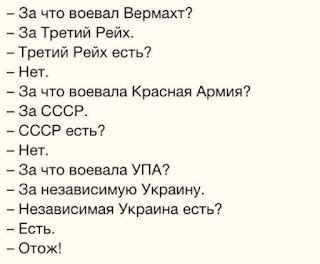What did they fight for?
This was in my Facebook feed, part of an argument about whether the UPA was really a fascist army. It's in Russian, and avoids that question for a more pragmatic answer.
Bing translates this as:
-Over that fought the Wehrmacht?
-For The Third Reich.
-The Third Reich?
-No.
-For which fought the Red Army?
-For The Ussr.
-USSR have?
-No.
-UPA fought for that?
-for an independent Ukraine.
-Independent Ukraine have?
-There are
-Otozh!
And Google as:
- For that I fought the Wehrmacht?
- During the Third Reich.
- Third Reich there?
-- No.
- For that fought the Red Army?
- During the Soviet Union.
- USSR there?
-- No.
- For that I fought the UPA?
- For Ukraine's independence.
- Independent Ukraine there?
-- There is
- Otozh!
Bing recognizes that the questions do, in fact, have subjects, where Google is thrown by (I guess) the word order and twice supplies one - the wrong one. It looks like the case marking on Красная Армия clued it in that time.
For some reason Bing varies its translation of "За что воевал(а) X" - what did X fight for - giving us three, the first two of which are okay. Google uses the same translation, but since it's interpolating "I" it's still wrong.
Bing screws up the simple "X есть?" questions - it's just "Does X exist?" - translating есть as "have". There is an idiomatic phrase "У X есть N?" meaning "Does X have?" but the У is crucial to that, as it's literal "Is there N at X?" or "Does N exist at X?". These questions aren't that one. Google is wrong, too, but differently, translating есть as "there".
Google also gets the wrong meaning for За in the answers. It's the same За - For - not the temporal one. You'd think it would realize that the answer to "What did X fight for?" would not be when X fought.
And neither of them got Отож! Which is, I suppose, somewhat understandable since it's not a Russian word. They do both get it when presented with it stand-alone and labelled Ukrainian.
My translation:
"What did the Wehrmacht fight for?"
"For the Third Reich."
"Does the Third Reich exist?" (or "Is there a Third Reich?")
"No."
"What did the Red Army fight for?"
"For the USSR."
"Does the USSR exist?" (or "Is there a USSR?")
"No."
"What did the UPA fight for?"
"For an independent Ukraine."
"Does an independent Ukraine exist?" (or "Is there an independent Ukraine?")
"Yes." (or "There is")
"So there!" (Or "Aha!" or "See!" or even maybe "Take that!")
Labels: Russian, tech, translation






























0 Comments:
-
<-- Older Post ^ Home Newer Post -->Post a Comment
Subscribe to Post Comments [Atom]